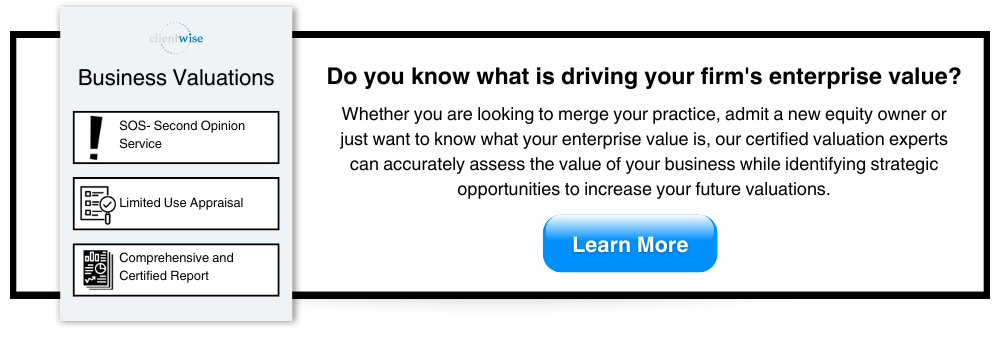When’s the Right Time to Hire a CEO?
“There’s no recipe for really complicated, dynamic situations.” – Ben Horowitz, The Hard Thing About Hard Things
Not every owner sets out to be a CEO. Most wealth advisory firm owners stumble into that role by accident—more by necessity than by design. It’s one of those unintended consequences of building a business: as you grow, you realize the need to scale, which means building out your leadership team. But here’s the real kicker: When do you step aside, and who do you bring in to lead the way? Do you lean in and grow your skills to fit the CEO’s shoes, or is it time to hire someone born to wear them?
For most firms, the founder or controlling owner defaults into the CEO role. At first, it’s manageable. But as operations grow more complex, so do the demands—and before long, your business may need someone who can manage the enterprise while freeing you to focus on what you love: clients and relationships. Or perhaps your run as CEO in your firm is ending, and replacing yourself might be the best move for the firm’s continued success. So, how do you know when to hire a CEO?
Let’s explore the when, who, and how of bringing in professional management—armed with the latest insights from the InvestmentNews Compensation & Staffing Update, Schwab, and Fidelity Benchmarking Studies. I want to help you figure out whether it's time to hire a CEO and how to find the perfect candidate to lead your firm into the future.
The ‘When’ – Identifying the Right Time
There’s no one-size-fits-all answer to identifying the right time to onboard professional management. There’s no secret sauce. Instead, determining when to hire a CEO will depend on the complexity of your organization and a range of critical metrics such as:
- Revenue Thresholds: according to M&A guru Liz Nesvold, most firms typically feel the need to hire a CEO intensify once they surpass $10 million in annual revenue.
- AUM Milestones: the Schwab Benchmarking Study shows that firms approaching $1 billion in AUM often experience a significant rise in operational complexity – requiring dedicated leadership to maintain growth momentum.
- Employee Growth: when your firm reaches around 20-25 employees, managing people, operations, and client needs may become excessively time-consuming for the founder, signaling the need for a CEO to oversee business operations.
- Client Expansion and Services Diversification: as you broaden your service offering (e.g., tax planning, legacy planning, etc.) and attract more clients, you’ll need to decide whether to focus your limited time on serving clients or managing operations.
In The Founder’s Dilemmas, Noam Wasserman explores founders' transitions and reveals that many struggle with letting go even when professional management could benefit the business. He notes, “founders who retain control and decision-making powers run a higher risk of losing both control and the value of their firms.” This reinforces the idea that knowing when to hire a CEO could be crucial to preserving both control and growth.
A recent Fidelity Benchmarking Study revealed that 83% of firms with over $1 billion AUM have introduced professional management roles. This indicates a trend toward early leadership adoption to sustain growth and avoid bottlenecks.
The ‘Who’ – Identifying an Ideal CEO Candidate
Finding the right CEO means looking for a leader with the experience, leadership ability, and cultural fit required to guide your firm. However, the demand for this type of high-caliber leadership is high, so expect the compensation to be commensurately high. The InvestmentNews 2021 Compensation Study indicates that CEOs in top-performing firms earn an average total compensation of $572,335. What skills, expertise, and traits are most essential?
While most controlling owners and founders aspire to develop next-generation talent to take over the reins, the timing, skill set, and desire of these team members may not always align with the demands of the CEO role. Often, team members were hired for different positions and may not be suited for or interested in CEO responsibilities—much like the founder or current controlling owner initially found themselves stepping into the CEO role more by necessity than intention.
Here are the seven essential qualities to look for in a CEO who can lead your firm toward its next growth stage while preserving its core values and culture.
-
Strategic Thinking: your CEO must develop and implement long-term growth strategies while keeping the firm competitive.
-
Operational Expertise: look for experience in managing compliance, finance, and technology—all critical wealth management components.
-
Emotional Intelligence (EQ): High EQ is essential to effectively lead teams, manage interpersonal conflicts, and nurture a collaborative culture.
-
Business Development Focus: while not every CEO needs to be a rainmaker, they must understand client acquisition strategies and align the firm’s operations to support growth.
-
Collaborative and Empowering: a successful CEO empowers your firm’s advisors and team to take ownership of their roles.
-
Resilient and Adaptive: given our industry's shifting and dynamic landscape, your CEO will need to navigate change while maintaining focus on the firm’s goals.
-
Humble Leadership: the right candidate will lead with humility, recognizing the unique contributions of each professional in your firm.
As Jim Collins describes in Good to Great, “Level 5 leaders channel their ego needs away from themselves and into the larger goal of building a great company.” This highlights the need for a CEO to drive growth with humility, aligning with the firm’s core mission and fostering a collaborative culture.
“Successful people become great leaders when they learn to shift from self-centered ambition to ambition for the cause, the company, the work,” Marshall Goldsmith reminds us in What Got You Here Won't Get You There. Your next CEO should embody this shift, demonstrating the emotional intelligence and resilience needed to lead your team effectively.
The ‘Where’ – Locating the Right Candidate
There are two primary approaches to sourcing a CEO – promoting from within or hiring externally. Each comes with certain advantages as well as challenges:
- Internal Candidates: Promoting from within offers continuity, as internal candidates will be deeply familiar with your firm’s culture and clients. However, depending on how tightly the founder has held the reins, these individuals may lack the operational expertise to scale the business effectively.
- External Candidates: Bringing in a CEO from outside the firm may help introduce new perspectives and operational skills. However, firms seeking to recruit externally typically remain within the financial services industry (e.g., broker-dealers, RIAs, or family offices).
The latest Schwab Benchmarking Study notes that 55% of firms with professional management hire externally – demonstrating that firms increasingly value fresh leadership from outside their immediate networks.
The ‘How’ – Structuring an Attractive Compensation/Ownership Package
Attracting top talent requires a competitive compensation package aligned with your firm’s performance goals. According to the InvestmentNews Compensation Study, top-performing CEOs earn base salaries and bonuses tied to firm revenue growth and operational efficiency. Additionally, long-term incentives (e.g., equity ownership or phantom equity) are essential to aligning the CEO’s interests with the firm’s future success.
Typically, CEO compensation structures will include the following:
- Base Salary: Align base salaries with industry benchmarks to remain competitive (e.g., $572,335 average for CEOs).
- Performance Bonus: Bonuses should be linked to metrics such as, but certainly not limited to, AUM growth, revenue growth, new clients, client satisfaction, and profitability to incentivize performance.
- Long-Term Incentives: Offer equity stakes or deferred compensation to align the CEO’s financial success with the firm’s growth, profitability, and enterprise value.
- Trial Period for Fit: Consider a two-year trial period before granting full equity ownership to ensure the fit is right for both the CEO and the firm.
The Schwab and Fidelity benchmarking studies found that equity participation and phantom shares are increasingly being leveraged to attract top-tier CEOs—allowing you to offer long-term alignment without immediately diluting ownership.
Navigating the CEO Transition for Sustainable Growth
Hiring professional management isn’t just a cost; it’s an investment that will enhance operational efficiency, drive profitability, ensure sustainable growth, and allow founders to refocus on client relationships and future partnerships. But it’s a pivotal decision that must align with your long-term vision for your business.
“One of the most difficult decisions a CEO can make is to let go,” Ben Horowitz reflects, “because it requires us to believe in the future of something we built and entrust it to someone else.” Recognizing this as an investment rather than a loss can help founders confidently approach the transition. At some point, you acknowledge as a fiduciary that you are simply the custodian of your business, responsible for securing its future beyond your role.
The right fit will bring strong strategic thinking and planning capabilities, operational expertise, emotional intelligence, and leadership skills to drive growth while preserving the culture that’s made you successful. If you genuinely wish to position your firm for sustained success, at some point, you will have to let go and embrace leadership transition with clarity and purpose.
COACHING QUESTIONS
These questions guide thoughtful reflection on your leadership path and readiness for change.
-
What core strengths do you bring to your current role that might limit or enable your firm’s next growth phase?
-
How would stepping aside or bringing in a professional CEO enable you to focus more on your personal and professional goals within the firm?
-
What specific qualities, beyond technical skills, do you envision in a CEO who could uphold your firm’s culture and vision while steering it toward growth, profitability, and endurance?
-
How would you support a new CEO in making a smooth transition, and what would you need to prepare to let go to enable their success? Consider responsibilities, timing, and evidence of success as you consider letting go!
About ClientWise LLC
ClientWise is the premier business and executive coaching firm working exclusively with financial professionals. We specialize in helping clients optimize growth and maximize revenue by engaging as a knowledgeable partner in accomplishing specific and significant business results. Our full-service coaching program empowers financial advisors, wholesalers, managers and executives to enhance performance through customized, action-oriented solutions based on each client’s specific vision and situation.
Our certified coaches are members of the International Coach Federation (ICF). They adhere to ICF’s strict code of ethics and have the experience and insight to work with you on the unique challenges and opportunities you face each day.
Drawing from an in-depth knowledge of the financial industry, ClientWise’s mission is to professionally develop industry leaders and consistently raise the bar for industry service, commitment and integrity. Simply put, our singular focus is to help you get clear, get focused, and get results.
Topics: Leadership Business Planning



